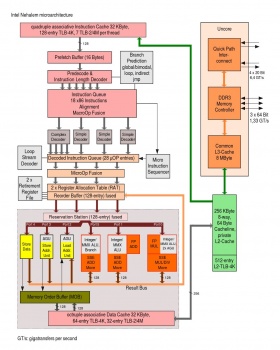Difference between revisions of "Intel Nehalem (microarchitecture)"
Onnowpurbo (talk | contribs) (New page: Initial Nehalem processors use the same 45 nm manufacturing methods as Penryn. A working system with two Nehalem processors was shown at [[Intel De...) |
Onnowpurbo (talk | contribs) |
||
| Line 2: | Line 2: | ||
The microarchitecture is named after the [[Tillamook (tribe)|Nehalem]] [[Native Americans in the United States|Native American]] nation in [[Oregon]]. At that stage it was supposed to be the latest evolution of the [[Intel NetBurst (microarchitecture)|NetBurst]] microarchitecture. Since the abandonment of [[Intel NetBurst (microarchitecture)|NetBurst]], the codename has been recycled and refers to a completely different project, although Nehalem still has some things in common with NetBurst. Nehalem-based microprocessors utilize higher clock speeds and are more energy-efficient than [[Penryn (microprocessor)|Penryn]] microprocessors. [[Hyper-Threading]] is reintroduced along with an L3 Cache missing from most Core-based microprocessors. | The microarchitecture is named after the [[Tillamook (tribe)|Nehalem]] [[Native Americans in the United States|Native American]] nation in [[Oregon]]. At that stage it was supposed to be the latest evolution of the [[Intel NetBurst (microarchitecture)|NetBurst]] microarchitecture. Since the abandonment of [[Intel NetBurst (microarchitecture)|NetBurst]], the codename has been recycled and refers to a completely different project, although Nehalem still has some things in common with NetBurst. Nehalem-based microprocessors utilize higher clock speeds and are more energy-efficient than [[Penryn (microprocessor)|Penryn]] microprocessors. [[Hyper-Threading]] is reintroduced along with an L3 Cache missing from most Core-based microprocessors. | ||
| + | |||
| + | The first computer to use Nehalem-based [[Xeon]] processors was the [[Apple Inc.|Apple]] [[Mac Pro]] workstation announced on March 3, 2009. Nehalem-based Xeon EX processors for larger servers were expected in Q4 2009 based on initial announcements from Intel, but in November 2009 the launch of these processors was pushed back to the first half of 2010. | ||
| + | |||
| + | Mobile Nehalem-based processors were introduced in September 2009. | ||
| + | |||
| + | ==Technology== | ||
| + | [[Image:Intel Nehalem arch.jpg|280px|right|thumb|Microarchitecture of the quad-core implementation]] | ||
| + | Various sources have stated the specifications of processors in the Nehalem family: | ||
Revision as of 08:11, 10 February 2010
Initial Nehalem processors use the same 45 nm manufacturing methods as Penryn. A working system with two Nehalem processors was shown at Intel Developer Forum Fall 2007, and a large number of Nehalem systems were shown at Computex in June 2008.
The microarchitecture is named after the Nehalem Native American nation in Oregon. At that stage it was supposed to be the latest evolution of the NetBurst microarchitecture. Since the abandonment of NetBurst, the codename has been recycled and refers to a completely different project, although Nehalem still has some things in common with NetBurst. Nehalem-based microprocessors utilize higher clock speeds and are more energy-efficient than Penryn microprocessors. Hyper-Threading is reintroduced along with an L3 Cache missing from most Core-based microprocessors.
The first computer to use Nehalem-based Xeon processors was the Apple Mac Pro workstation announced on March 3, 2009. Nehalem-based Xeon EX processors for larger servers were expected in Q4 2009 based on initial announcements from Intel, but in November 2009 the launch of these processors was pushed back to the first half of 2010.
Mobile Nehalem-based processors were introduced in September 2009.
Technology
Various sources have stated the specifications of processors in the Nehalem family:
